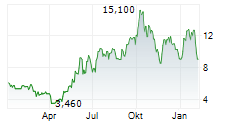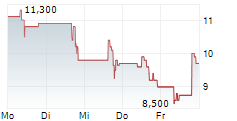Hydrochemolytic oil was processed "as is" without hydrotreatment or dilution achieved stable furnace operation, and olefin yields comparable to conventional liquid feedstocks, validating its potential as a drop-in-compatible circular feedstock for steam crackers
LONDON, Ontario, Nov. 20, 2025. ("Aduro" or the "Company") (Nasdaq: ADUR) (CSE: ACT) (FSE: 9D5), a clean technology company using the power of chemistry to transform lower value feedstocks, like waste plastics, heavy bitumen, and renewable oils, into resources for the 21st century, announces the successful completion of pilot-scale steam-cracking trials by a global organization that designs, licenses, and services large-scale petrochemical steam-cracking operations and supports global deployment of these technologies among leading petrochemical producers.
Steam crackers provide building blocks for almost all plastics, starting from oil- and gas-derived feedstock. Similarly, circular feedstocks from waste plastics will have to follow the same route to be processed into circular plastics. Steam crackers are very large-scale plants and are highly sensitive to feedstock quality, requiring high-purity inputs at scale. As a result, most circular oils produced by chemical recycling require further upgrading or pre-treatment (such as hydrotreatment) to meet those tight input specifications.
Alternative chemical recycling processes typically yield products that are high in olefins and hetero-atom content as well as other contaminants and require upgrading - such as pre-treatment or hydrotreatment - to be suitable as cracker feedstock. In efforts to try and minimize costly upgrading, extensive sorting and cleaning are often required, adding significantly to the cost of the feedstock. This also results in higher rejection rates of suitable polyolefins while increasing the environmental footprint of such processes. By contrast, Aduro's Hydrochemolytic Technology achieves the transformation of plastics-to-liquid hydrocarbons with much higher saturation rate and lower impurity content. In addition, the boiling range of the Aduro Hydrochemolytic oil is substantially lower compared to comparable chemical recycling oils, which is beneficial for application as steam cracker feedstock.
The trials were carried out in October 2025 at an established pilot-scale cracking facility in Europe, using a hydrocarbon liquid product Aduro produced from a mixed waste plastic feedstock consisting of polyethylene, polypropylene, polystyrene, PET, and polyamide. The Hydrochemolytic oil was processed in the pilot-scale steam-cracking furnace as-produced, without dilution or further pre-treatment, under various operating conditions. This demonstration of high suitability for the extremely stringent feedstock specification of steam crackers without the need for costly post-treatment represents an important third-party validation milestone for the Hydrochemolytic Technology and its application in circular plastics value chains.
Cracking of the Aduro Hydrochemolytic oil was achieved under stable furnace operation with yields of ethylene and propylene, key building blocks of polyethylene and polypropylene, comparable to those from comparable fossil feedstock. Most significantly, the cracking trials showed that this particular Aduro product may be used as a cracker feedstock without additional hydrotreatment or dilution. This enables a significant reduction in process complexity, capital investment, and operational expense for downstream operators, supporting improved project economics with potentially higher value to this product while improving its environmental footprint. These results indicate that operators may be able to integrate this particular stream with minimal modifications, significantly simplifying the pathway from waste plastics to circular olefins.
For olefin producers and steam-cracker operators, these findings are significant. The current data suggest that Aduro's Hydrochemolytic process can generate a stable, low-contaminant liquid feedstock that can be processed within existing steam-cracking systems with minimal modification. This compatibility builds confidence in the potential of Aduro's technology to help bridge the gap between waste plastic sources and the production of new, virgin-quality plastics, strengthening the economic and environmental model while supporting the transition to circular and sustainable materials.
"This testing was completed by a global organization with deep expertise in steam-cracking technologies and operations, and their evaluation points to strong potential for liquids produced through our Hydrochemolytic Technology to meet the strict performance needs of cracking operations," said Ofer Vicus, CEO at Aduro. "The oil was processed as produced, without dilution or post-treatment, while maintaining characteristics aligned with demanding feedstock requirements. That level of suitability points to a pathway where HCT-derived liquids could be engineered for commercial furnaces with significantly reduced or simplified upgrading steps, creating meaningful cost and efficiency benefits. As we move from pilot to demonstration scale, this represents an important milestone in our commercialization pathway and a strong indication of the value our technology can bring to large-scale circular plastics production."
The trial represents a milestone in Aduro's broader program of technology validation and market engagement. Building on these results, the Company intends to collaborate with additional global partners to evaluate feedstock quality, scalability, and integration pathways for its Hydrochemolytic Technology.
About Aduro Clean Technologies
Aduro Clean Technologies is a developer of patented water-based technologies to chemically recycle waste plastics; convert heavy crude and bitumen into lighter, more valuable oil; and transform renewable oils into higher-value fuels or renewable chemicals. The Company's Hydrochemolytic technology relies on water as a critical agent in a chemistry platform that operates at relatively low temperatures and cost, a game-changing approach that converts low-value feedstocks into resources for the 21st century.
For further information, please contact:
Abe Dyck, Head of Corporate Development / Investor Relations
ir@adurocleantech.com
+1 226 784 8889
KCSA Strategic Communications
Jack Perkins, Senior Vice President
aduro@kcsa.com
Forward-Looking Statements
This news release contains forward-looking statements within the meaning of applicable Canadian and U.S. securities laws, including the U.S. Private Securities Litigation Reform Act of 1995. Forward-looking statements in this release include, but are not limited to: statements regarding the interpretation of pilot-scale steam-cracking results; the potential for Aduro's Hydrochemolytic oil to serve as a drop-in feedstock for commercial steam crackers without further upgrading; anticipated reductions in process complexity, capital investment, and operational expense for downstream operators; the potential for integration of Aduro's technology into existing petrochemical infrastructure; the Company's plans to collaborate with additional global partners; the suitability of Hydrochemolytic oil for use in commercial furnaces with minimal modifications; the advancement, scalability, and integration pathways of the Company's technology; and the Company's broader program of technology validation and market engagement. Forward-looking statements are based on management's current expectations and assumptions, including assumptions regarding: the replicability of pilot-scale results at commercial scale; the continued availability of partners, facilities, and resources; the technical and economic feasibility of integrating Hydrochemolytic oil into existing steam-cracking operations; the ability to maintain stable furnace operation and achieve comparable olefin yields at larger scale; the effectiveness of the technology in reducing process complexity and environmental footprint; the willingness of industry participants to adopt new feedstocks; and the stability of regulatory and market conditions supporting circular plastics. These statements are subject to a number of risks and uncertainties, including, but not limited to: the risk that pilot-scale results may not be replicated at demonstration or commercial scale; challenges in scaling up the technology or integrating it into existing infrastructure; the availability and willingness of partners to participate in further trials or commercialization; changes in regulatory frameworks or market acceptance of circular plastics; operational risks; the risk that the quality or composition of waste plastic feedstock may impact performance; the need for additional testing and validation with different feedstock types and operating conditions; the possibility that further upgrading or pre-treatment may be required at commercial scale; the ability to obtain required financing for further testing and development of the technology; and the Company's ability to execute on its development plans and commercialization pathway; and other factors described in the Company's public filings available at www.sedarplus.ca. Actual results may differ materially from those expressed or implied by such forward-looking statements. Readers are cautioned not to place undue reliance on forward-looking statements. Except as required by law, Aduro undertakes no obligation to update or revise any forward-looking statements, whether as a result of new information, future events, or otherwise.

A photo accompanying this announcement is available at https://www.globenewswire.com/NewsRoom/AttachmentNg/660bb211-7368-49f6-8012-c849c5eb3824



